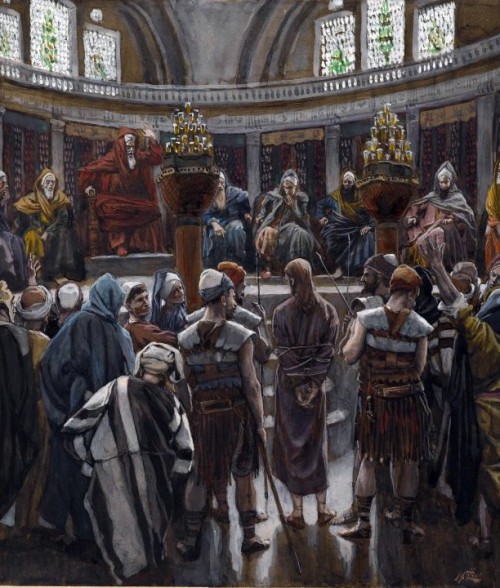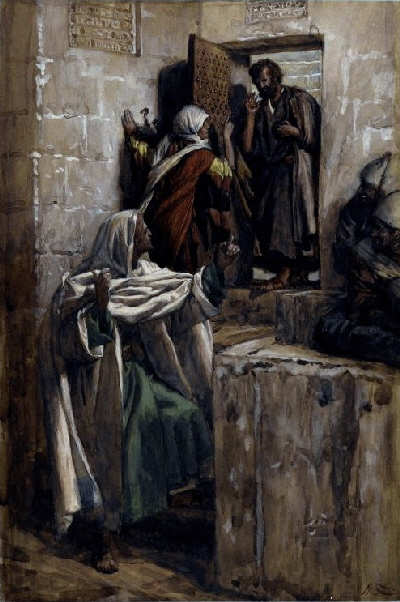|
<< Mark XIV: In the High Priest's Palace >>
 THE Lord was led first to Annas the father in law of Caiaphas the high priest, but soon after to the palace of Caiaphas himself. We think of them as going by an arched gale way from the street into a court-yard, with the buildings of the palace all about it. The floor of the court was paved with marble, perhaps in the middle was a fountain and flowering plants. The doors and windows of the palace opened upon this court. At one side there may have been a hall raised a. few steps above the pavement and open by a broad high arch, so that those in the court could see plainly all that was done in the hall above. On the floor of the hall perhaps were rugs, and it was lighted by hanging lamps. As the Lord was brought by the band of soldiers into the palace, the priests in their white robes and turbans were hastily gathering in this hall and taking their places upon the cushions or divans at the sides. The high priest Caiaphas had the middle place. The Lord stood in the midst guarded by servants. Other servants and soldiers stood here and there in the court below, and warmed themselves at a fire of charcoal, for it was still night, and it was cool. THE Lord was led first to Annas the father in law of Caiaphas the high priest, but soon after to the palace of Caiaphas himself. We think of them as going by an arched gale way from the street into a court-yard, with the buildings of the palace all about it. The floor of the court was paved with marble, perhaps in the middle was a fountain and flowering plants. The doors and windows of the palace opened upon this court. At one side there may have been a hall raised a. few steps above the pavement and open by a broad high arch, so that those in the court could see plainly all that was done in the hall above. On the floor of the hall perhaps were rugs, and it was lighted by hanging lamps. As the Lord was brought by the band of soldiers into the palace, the priests in their white robes and turbans were hastily gathering in this hall and taking their places upon the cushions or divans at the sides. The high priest Caiaphas had the middle place. The Lord stood in the midst guarded by servants. Other servants and soldiers stood here and there in the court below, and warmed themselves at a fire of charcoal, for it was still night, and it was cool.
The priests tried to find some excuse that they might bring the Lord to the Roman Governor and demand His death. He had done nothing wrong; He had spoken only the truth and done only acts of love. As they accused Him He made no answer. 'As a sheep before her shearers is dumb, so he openeth not his mouth." At length the high priest asked Him if He were the Christ, and He answered plainly that He was. This was enough. They would make it appear that the Lord claimed to be a king and disputed Caesar's power. The priests now scattered to their homes, and the Lord was left standing with the servants. They struck Him and ill-treated Him.
 Peter stood looking on with those in the court below, and three times as they asked him if he were not one of the Lord's disciples, he denied that he knew Him. Then the Lord turned and looked upon Peter, and it all came back, how he loved the Lord, how he said that he would die with Him, and how the Lord warned him that he would deny Him. So the night passed, and in the early morning the priests returned, a larger company, and led the Lord away to accuse Him to Pilate the Roman Governor. Peter stood looking on with those in the court below, and three times as they asked him if he were not one of the Lord's disciples, he denied that he knew Him. Then the Lord turned and looked upon Peter, and it all came back, how he loved the Lord, how he said that he would die with Him, and how the Lord warned him that he would deny Him. So the night passed, and in the early morning the priests returned, a larger company, and led the Lord away to accuse Him to Pilate the Roman Governor.
And they led Jesus away to the high priest: and with him were assembled all the chief priests and the elders and the scribes. And Peter followed him afar off, even into the palace of the high priest: and he sat with the servants, and warmed himself at the fire. And the chief priests and all the council sought for witness against Jesus to put him to death; and found none. For many bare false witness against him, but their witness agreed not together. And there arose certain, and bare false witness against him, saying, We heard him say, I will destroy this temple that is made with hands, and within three days I will build another made without hands. But neither so did their witness agree together. And the high priest stood up in the midst, and asked Jesus, saying, Answerest thou nothing? what is it which these witness against thee? But he held his peace, and answered nothing.
Again the high priest asked him, and said unto him, Art thou the Christ, the Son of the Blessed? And Jesus said, I am: and ye shall see the Son of man sitting on the right hand of power, and coming in the clouds of heaven. Then the high priest rent his clothes, and saith, What need we any further witnesses? Ye have heard the blasphemy: what think ye? And they all condemned him to be guilty of death. And some began to spit on him, and to cover his face, and to buffet him, and to say unto him, Prophesy: and the servants did strike him with the palms of their hands.
And as Peter was beneath in the palace, there cometh one of the maids of the high priest: And when she saw Peter warming himself, she looked upon him, and said, And thou also wast with Jesus of Nazareth. But he denied, saying, I know not, neither understand I what thou sayest. And he went out into the porch; and the cock crew. And a maid saw him again, and began to say to them that stood by, This is one of them. And he denied it again. And a little after, they that stood by said again to Peter, Surely thou art one of them: for thou art a Galilaean, and thy speech agreeth thereto. But he began to curse and to swear, saying, I know not this man of whom ye speak. And the second time the cock crew. And Peter called to mind the word that Jesus said unto him, Before the cock crow twice, thou shalt deny me thrice. And when he thought thereon, he wept.---Mark XIV.53-72.
Author: William L. Worcester 1904
Spiritual Correspondences
"Ask them which heard Me, what I have said," >> Ask only those who obey the Word for explanations of it. (Only those who read with willingness to obey can find the precious wisdom in the Bible. To those who have this willingness the Lord can speak, but not to those who question with idle curiosity, or to criticize and deny.)
The "officers" and "servants" who struck the Lord >> The hand giving outward expression to the hatred in the heart
It was cold and Peter warmed himself at the fire >> The absence of love and its warmth; when love for the Lord fails and we content ourselves with natural and selfish loves, then faith is sure to lose its light
Peter denies the Lord three times >> What is made complete in feeling, thought, and deed (It is a first denial, when we admit an evil feeling contrary to the Lord. We deny Him a second time when we think the false thoughts which the evil feeling suggests. And it is a third and last denial when we do the evil deed.)
The cock crowing (ending of the night and the beginning of the dawn) >> Peter experiencing the beginning of a new spiritual state
The Lord turned and looked upon Peter >> The memory of his love and his earnest professions of faithfulness and the associated remorse
Peter wept >> "To mourn has respect to grief on account of night as to goods in the church, and to weep as to truths." E. Swedenborg
Spiritual Meaning
The church has rejected the Lord as the Presence of the Heavenly Father, and has incited the world to reject Him. By perverting its faith and its charity, it has destroyed His true character, and made Him in the eyes of the world a fraud and a pretender.
Judas had acted out his self-love, as Peter also had shown his. And he too repents, bringing back, as now worthless, what the self had desired, and despairing because of the loss of the Lord. Will not the church in like manner repent of her sin of appropriating holy good and holy truth to self, and, despairing of ever being able to receive them worthily, condemn herself utterly. And then may there not be given so strong a sense that these holy things are the Lord's, and are with us of His Mercy, that they will not be so misappropriated ?
The sin of Judas was the same as that of the priests ; yet he repented, and they did not. Is not this a sign of hope for the Christian Church, as well as for Judas ?
The thirty pieces of silver Swedenborg says stands for the "little esteem for the merit of the Lord and redemption and salvation by Him ;the potter, for reformation and regeneration." (AC 2276.) That the silver was given for the potter's field, "to bury strangers in," means then that the Lord's redemption and salvation, so lightly esteemed, were made over to the Gentiles for their reformation and regeneration, and thus resurrection to life. (Author: John Worchester, 1898. Matthew's Gospel.)
Pictures: James Tissot ----Courtesy of the Brooklyn Museum
|
|